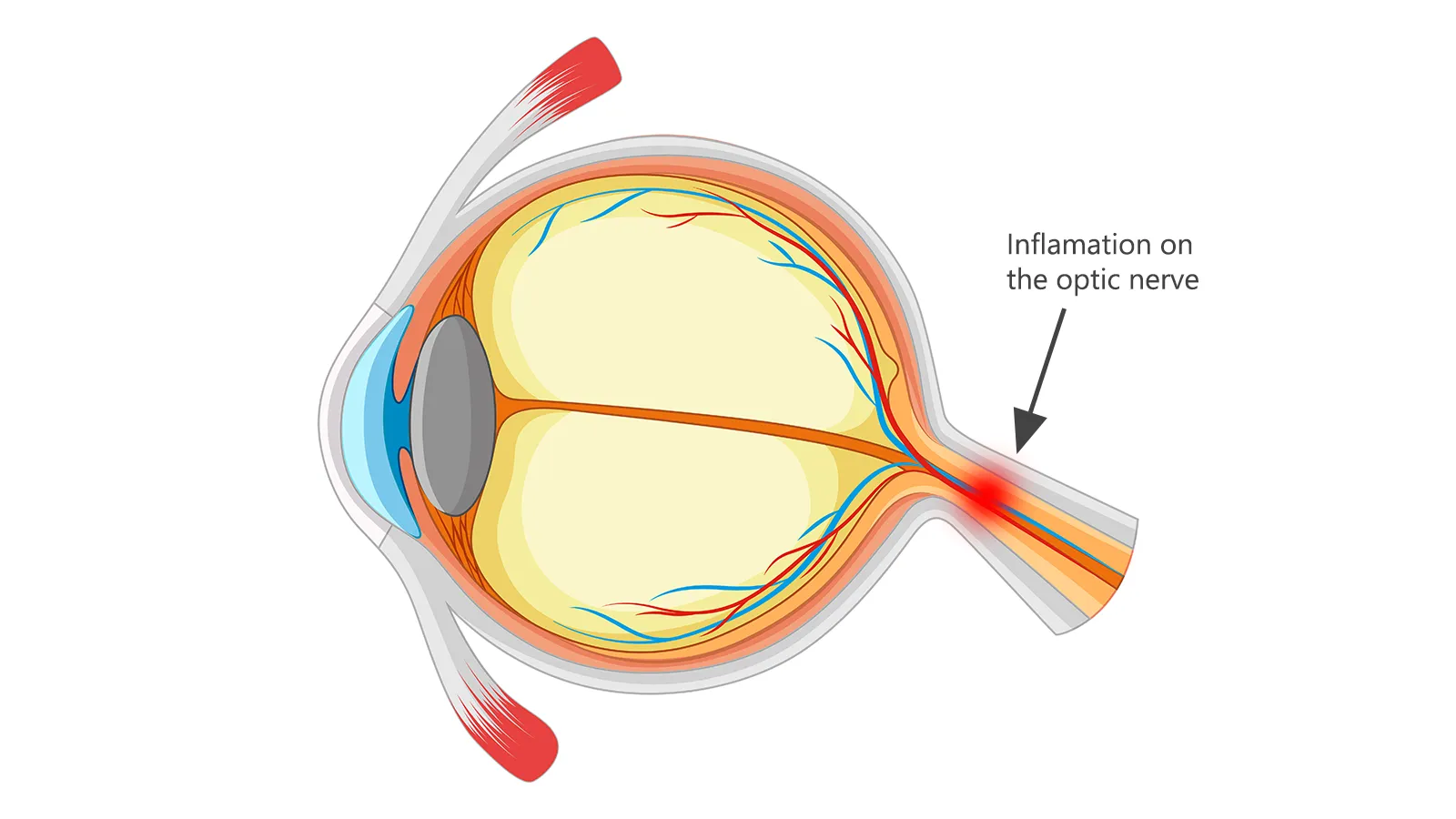It is rightly said that the brain and eyes are interconnected, and for the proper functioning of your body, both should be aligned. The brain is responsible for sending signals to the body and the eyes to view the world. However, there are certain conditions in which the optic nerve, which sends signals, gets inflamed and leads to vision problems. We are talking about Optic neuritis. If you are wondering what it is and how to treat the same, stay with us till the end of the blog.
What is Optic Neuritis?

Optic neuritis is a condition in which the optic nerve, which sends signals to your brain, gets inflamed. The optic nerve sends messages from your eyes to your brain so it can interpret visual signals. But when this nerve is inflamed or irritated, it doesn’t send the signals that well and as a result, you struggle to see clearly.
Optic neuritis affects your vision and causes pain. This condition can pop up suddenly from an existing nerve disease or infection. It can cause temporary vision loss that usually occurs in only one eye. But, as soon as the inflammation ends, your vision gets back to normal.
The inflammation of the nerve fibres can also make the optic nerve swell, which may or may not affect both eyes. This condition can be found in both adults and children. And while the underlying cause isn’t completely understood, eye experts believe that it could be due to an immune system response.
Symptoms of Optic Neuritis

This problem can sneak up on you real quick, within days or even hours. But when it gets to you, the following symptoms will let you know:
Pain or discomfort when moving your eyes
Loss of colour vision
Blurred vision
Peripheral vision loss
Vision loss in one eye lasting for 7 to 10 days
Seeing flashing lights on the side of your eyes
Changes in pupil reflexes against bright light
Adults develop optic neuritis in only one eye, but children can get this problem in both eyes. Some people recover from this condition within a few weeks, while others might take up to a year. And in some cases, you might not recover completely, as when all the other symptoms disappear, you can still experience trouble with night vision or seeing colours.
What Causes Optic Neuritis?

The cause of this condition isn’t always clear. Doctors believe that it happens when something goes wrong in your immune system, and it starts to attack the optic nerve, taking it for an invader. It attacks myelin, the insulating layer around the nerves, and once it gets inflamed or damaged, it becomes unable to carry messages to the brain.
Optic neuritis has also been linked with multiple sclerosis, as it’s present in almost half of the people with MS. Optic neuritis could also be an early symptom of multiple sclerosis. This is why most people with MS wear prescription glasses or contacts as they need them to see clearly.
Schilder’s disease and neuromyelitis are other types of nerve diseases that can cause this eye condition. Other causes of ON may include:
Bacterial infections such as Lyme disease
Viral infections such as mumps and measles
Autoimmune diseases such as lupus or sarcoidosis
An immune reaction after taking a vaccination
Certain medications, such as antibiotics and quinine
Guillain-Barre syndrome
Tuberculosis
Hepatitis B
HIV
Radiation therapy
To know the exact cause behind optic neuritis, you need to get an eye test first. A comprehensive eye exam can detect the development of anything wrong with your vision and alert you in advance. Get a free eye test from us to keep your eyes healthy and keep track of your ocular health.
Who is at Risk for Optic Neuritis?
You have a higher risk of developing optic neuritis if you:
Have multiple sclerosis
Are between 20 to 40 years of age
Live at higher altitudes
Have genetic disorders or mutations
How is Optic Neuritis Diagnosed?

It’s easy to mistake optic neuritis for optic neuropathy, which is why careful diagnosis is important. One can detect this problem with the help of the following tests:
MRI scan
Thorough medical checkup
Evaluating how your eyes respond to bright light
Using the eye chart to test your visual acuity
Testing the colour differentiation ability of the eyes
More tests and exams can help determine the true cause of optic neuritis. However, identifying the actual trigger isn’t always possible.
Treatment for Optic Neuritis
Optic neuritis and the symptoms associated with it generally go away on their own, and you won’t need any form of treatment. To accelerate the healing process, your doctor might prescribe you high-dose steroid drugs to reduce your risk of multiple sclerosis if that’s the perpetrator of this problem.
While it would reduce the swelling of the optic nerve, this method won’t make any difference in your vision. You’ll feel temporary vision problems, such as poor night vision, for which you can use tinted glasses with an amber or yellow lens tint, as they help you see in the dark. If your optic neuritis is the result of a certain health condition, the treatment method would focus on treating that condition.
The Outlook
Even when your vision gets back to normal, you can have ON again, especially if you have multiple sclerosis. Your eyesight is one of your precious senses. So, don’t wait for the damage to get worse. Understand the warning signs and act on the problem before it leaves a lasting effect on your vision. If you need tinted lenses, you can explore our range of tinted glasses or customise any frame with the tint of your choice.
Caution: You may become style obsessed
Your way finder
2000+ Trendy Styles

Fashion Forward Sunnies





















































